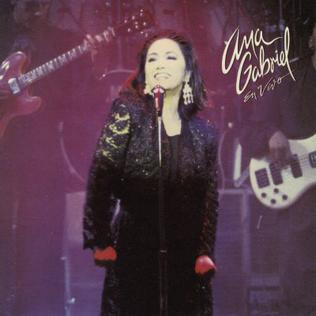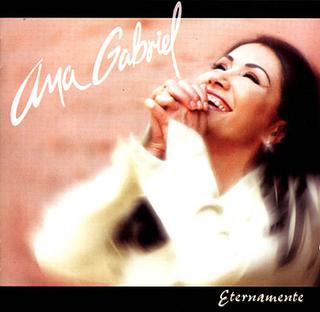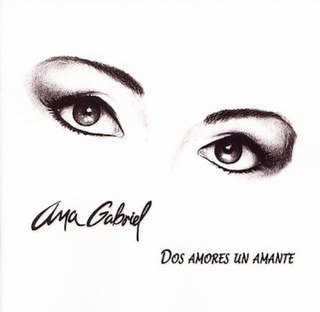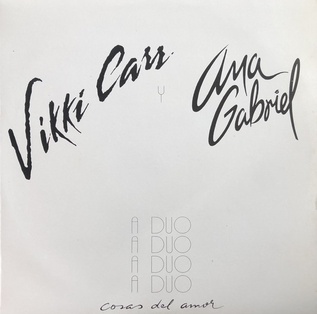
María Guadalupe Araujo Yong, better known as Ana Gabriel, is a Mexican singer and songwriter. During her long career, she has performed different genres of music and has received several accolades. As a result, she has been called La Diva de América and La Luna de América.

The discography of Puerto Rican Latin pop singer Chayanne includes 16 studio albums, 3 compilation albums and 2 live albums. Chayanne's albums have sold over 30 million albums worldwide. 5 of his albums have charted on the Billboard 200 chart and he has had 5 number 1 albums on the US Latin Billboard charts. Many of his albums have been certified platinum with Atado a Tu Amor being certified 5× platinum in Argentina for selling over 500,000 copies. The album was also certified gold in the United States. In addition to the albums, Chayanne has released 60 singles and 58 music videos. Throughout his career, Chayanne has been signed to record labels, Sony Music and RCA Records.

Reik is the debut eponymous album from Mexican Latin pop group Reik, released on May 24, 2005 through Sony BMG. The album features these singles: "Yo Quisiera", "Qué Vida La Mía", "Noviembre Sin Ti", "Niña" and "Levemente".

Sagitario is the second studio album by Mexican pop singer Ana Gabriel. It was released in 1986. Once again, she participated in the OTI Festival with the song A tu Lado which she achieved the 5th place.

Pecado Original(English: Original Sin) is the third studio album by Mexican singer Ana Gabriel. It was released by CBS Records on December 8, 1987. The album was produced by Mariano Perez Bautista.

Quién como tú is the fifth studio album by Mexican pop singer Ana Gabriel. It was released on November 17, 1989. The album was nominated to the Grammy Award for Best Latin Pop Album in 1990, but lost to José Feliciano's ¿Por Qué Te Tengo Que Olvidar?. The album was awarded "Pop Album of the Year" at the 1991 Lo Nuestro awards. The album reached number one in the Billboard Latin Pop Albums staying in the chart for 48 weeks.

En Vivo is the sixth album by Mexican pop singer, Ana Gabriel. It was released on 1990. This album reached No. 1 in the Billboard Latin Pop Albums. This was her first live material and was nominated for Pop Album of the Year at the Lo Nuestro Awards of 1992.

Mi México is the seventh studio album by Mexican pop singer Ana Gabriel. It was released in 1991. In this album, she left behind her usual pop genre and instead sang in ranchera and regional styles. By 2009, Mi México had sold 4.5 million copies worldwide.

Silueta is the eighth studio album by Mexican pop singer Ana Gabriel. It was released in 1992. This material was produced by Gabriel and Max Pierre.

Ayer y Hoy is the 10th studio album by Mexican pop singer Ana Gabriel. It was released on 1994. This material was produced by herself. She praises several idols of ranchera music with this material like Agustín Lara, José A. Jiménez, Juan Gabriel, Armando Manzanero and Cuco Sánchez. Ayer y Hoy was nominated for a Lo Nuestro Award for Regional Mexican Album of the Year at the 7th Lo Nuestro Awards.

Joyas de dos siglos is the eleventh studio album by Mexican pop singer, Ana Gabriel. It was released on 1995. This material was produced by herself and Diana Veronica Paredes. This album is somewhat of a departure from Gabriel's usual style, but it is one of the artistic high points of her career. It was nominated for Regional Mexican Album of the Year at the Lo Nuestro Awards of 1996.

Vivencias is the twelfth studio album by Mexican pop singer, Ana Gabriel. It was released on 1996. This material was produced by herself.

Con un mismo corazón is the 13th studio album by Mexican pop singer Ana Gabriel. It was released on 1997. This material was produced by herself. Nine out of the 12 tracks were written by Gabriel herself, and these songs follow her typical way of lyrics about heartbreak and abandonment already established by composers like José Alfredo Jiménez. In fact, Gabriel covered one of Jimenez's songs with verve. The darkly toned "Me Equivoqué Contigo" shows the singer meeting the erroneous man at the altar of the church. It has the duet with the thunderous-voiced Vicente Fernández. Her delightfully raspy voice has never found a better companion. It was nominated for Regional/Mexican Album of the Year at the 10th Lo Nuestro Awards.

Soy como soy is the 15th studio album by Mexican pop singer, Ana Gabriel. It was released on 1999. This material shows her firmly planted in the pop music, guided by the masterful hand of producer Emilio Estefan Jr. Gabriel composed some of the songs, with collaborations by Estefan himself, as well as renowned pop composer Kike Santander. It was recorded at Crescent Moon Studios, Miami, Florida.

Eternamente is the 16th studio album by Mexican pop singer Ana Gabriel. It was released in 2000. This material shows a nostalgic Ana Gabriel where she pays tribute to the Bolero's fathers Los Panchos and Los Diamantes. It was recorded at Sony Studios, Mexico.

Dos amores un amante is the 20th studio album by the Mexican pop singer, Ana Gabriel. It was released in 2005. It was produced by herself. It was nominated in the category of Female Latin Pop Album Of The Year in the Latin Billboard Music Awards of 2007, but lost to Paulina Rubio's Ananda.
"Hasta Que Te Conocí" is a song by Mexican singer-songwriter Juan Gabriel. It was released in 1986 as the third single from his studio album Pensamientos. Written and produced by Gabriel, the song's lyrics focus on a protagonist learning the meaning of suffering after meeting a lover who mistreats him. It peaked at number two on the Billboard Hot Latin Song chart. A live version of the song was included on his album En el Palacio de Bellas Artes (1990) which peaked at number ten on the Hot Latin Songs chart.

"Es Demasiado Tarde" is a song written and performed by Mexican singer-songwriter Ana Gabriel. It was released in 1990 by CBS Records and first included on the compilation album México, Voz y Sentimiento which also featured songs performed by Luis Angel, Vikki Carr, Aida Cuevas, Lorenzo de Monteclaro, Antonio De Jesús, Pedro Fernández, Hermanas Huerta, Tania Libertad, Angelica Maria, Lucía Méndez, Angeles Ochoa, Gilberto Parra, Gerardo Reyes, Cuco Sánchez, Cecilia Toussaint, Yuri and Flor Yvon. The song became Gabriel's fourth number-one single in the Billboard Top Latin Songs chart, after "Ay Amor", "Simplemente Amigos" and "Quién Como Tú". Personalidad: 20 Éxitos was the first Gabriel album to include the song. "Es Demasiado Tarde" is a song about a woman who refuses to take her lover back after the end of their relationship. Gabriel also addressed this issue in her song "Tú lo Decidiste" in 1994. The song earned the Lo Nuestro Award for Best Pop Song.

"Cosas del Amor" is a song by American recording artist Vikki Carr and Mexican singer-songwriter Ana Gabriel. It was released as the lead single from Carr's studio album Cosas del Amor (1991). Written by Roberto Livi and Rudy Pérez, the song portrays the relationship between two friends and confidences between both due to marital problems of one of them.
This is the singles discography for Mexican singer Ana Gabriel.


















